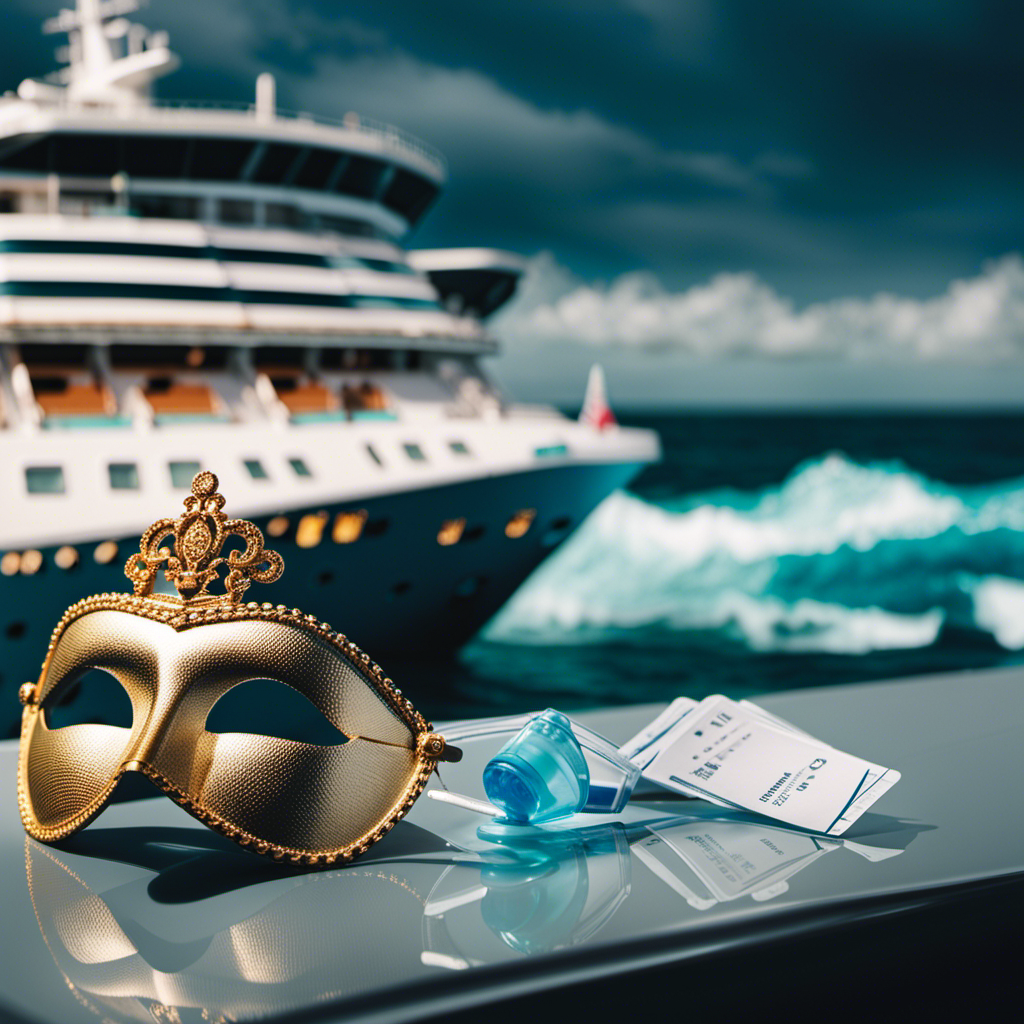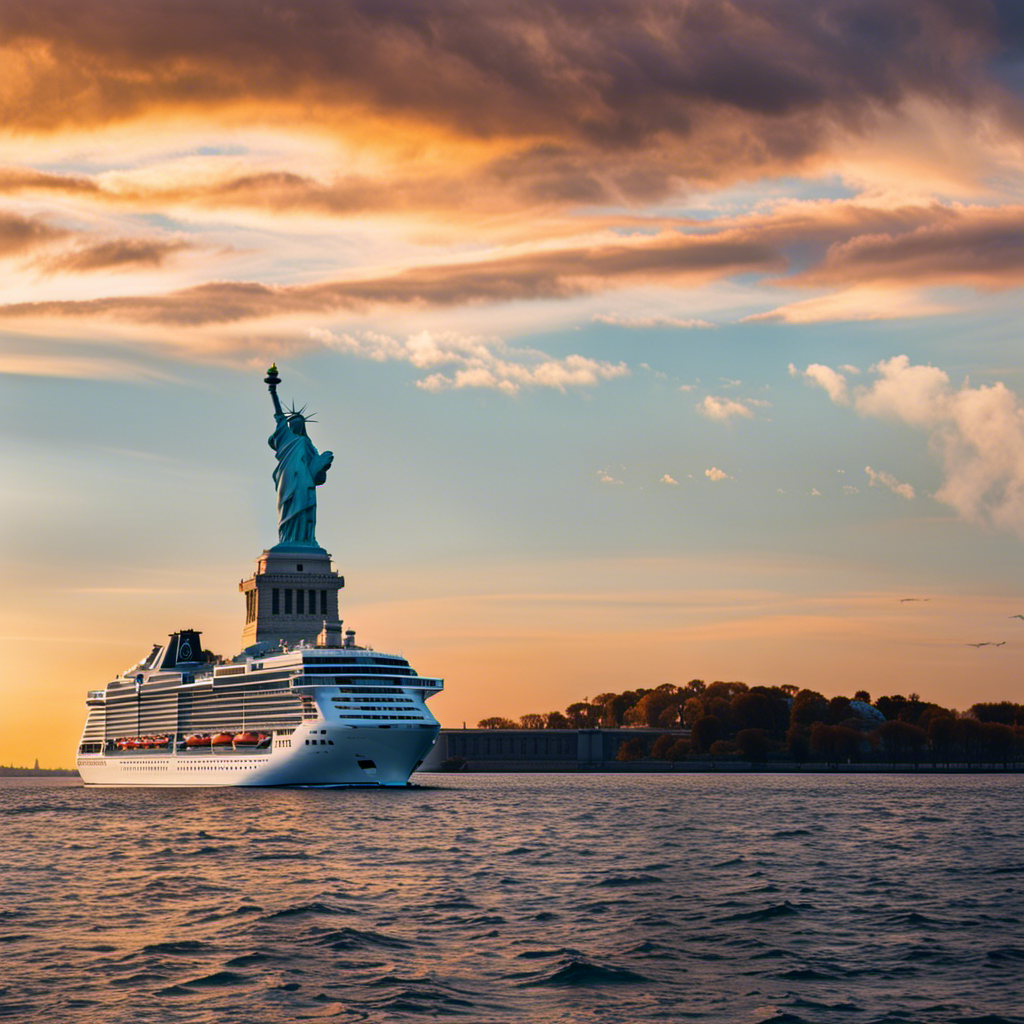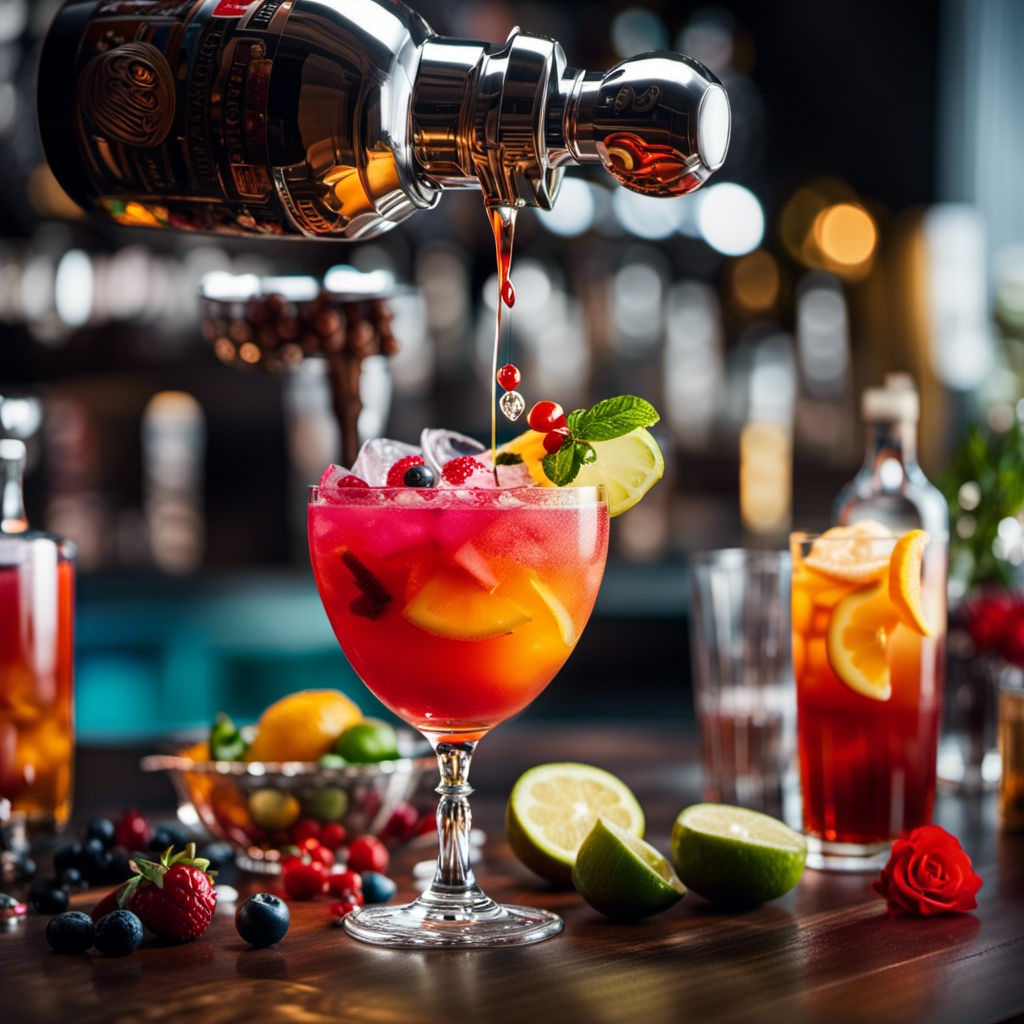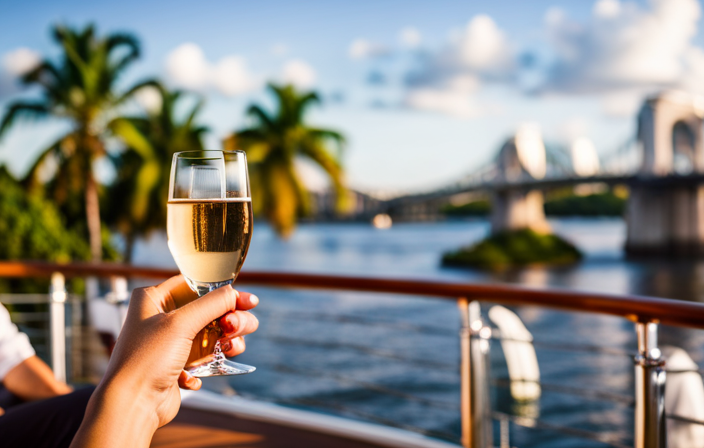Navigating the turbulent waters of the cruise industry, I face unmatched challenges in the era of Omicron. With the rapid rise in COVID-19 cases on cruise ships hitting alarming levels, it’s clear that our industry must swiftly adapt to this new environment.
The pre-Omicron protocols that once kept cases at bay are no longer as effective, and the CDC has issued a Level 4 travel warning, urging the public to avoid cruise travel altogether. Ports are denying docking, itineraries are being adjusted, and the future of cruising hangs in the balance.
In this article, we will explore the impact of Omicron on the cruising industry, the rising number of COVID cases at sea, the challenges faced by cruise lines, and the necessary adaptations that must be made to ensure a safe and successful future.
Key Takeaways
- Rising COVID cases on cruise ships, with 85% of ships having possible cases by the end of December and 5,013 cases reported between December 15-29.
- Pre-Omicron success in keeping cases low through protocols such as vaccines, negative tests, and contact tracing, with a relatively low number of cases per day among thousands of passengers and crew.
- CDC’s travel warning for cruises raised to Level 4, advising the public to avoid cruise travel, even if vaccinated, and recommending vaccination and booster shots for those still planning to sail.
- Denial of ports and adjustments to itineraries due to cases on ships, with some ports requiring health status details and COVID tests for cruise passengers before docking, leading to disruptions and logistical challenges.
The Impact of Omicron on the Cruise Industry
The impact of the Omicron variant on the cruise industry is evident in the rising cases affecting more ships and the uncertainty surrounding the future of cruising. Omicron’s effect on cruise operations has led to increased challenges for the industry.
Strategies for managing Omicron cases at sea have become crucial to ensure the safety of passengers and crew. Cruise lines have implemented protocols such as vaccines, negative tests, and contact tracing to keep cases low. However, the dominance of the Omicron variant has presented new challenges.
The CDC has raised the cruise ship travel warning to Level 4, advising the public to avoid cruise travel, even if vaccinated. Some ports have denied docking due to cases on ships, leading to adjustments in itineraries.
The cruise industry is continuously adapting and implementing new protocols to keep pace with the virus and ensure the future of cruising.
Rising COVID Cases at Sea: A Look at the Numbers
As a passenger, I am concerned about the increasing number of COVID cases on cruise ships. The Omicron variant has had a significant impact on cruise ship protocols, and there are growing concerns about future sailings.
According to the CDC’s daily color status report, 85% of ships had possible cases by the end of December, with 5,013 cases reported between December 15 and 29. The dominance of the Omicron variant has led to an increase in yellow ship instances. Prior to the Omicron variant, cruise lines had successfully kept cases low through protocols such as vaccines, negative tests, and contact tracing.
However, with the rising cases, the CDC has raised the cruise ship travel warning to Level 4, advising the public to avoid cruise travel, even if vaccinated. Ports have also started denying docking to ships with cases, leading to adjustments in itineraries. The CDC’s oversight program is set to become voluntary on January 15, and it remains uncertain if cruising will be paused again.
The cruise industry is adapting by implementing mask requirements, extended testing at the pier, and considering additional protocols such as requiring booster shots and universal testing. The rising cases are impacting more ships, and there is uncertainty regarding the future of cruising.
While the number of cases at sea may be lower compared to land, continuous monitoring and adaptation by the cruise industry, along with the importance of vaccination and adherence to protocols, are crucial in combating the virus and ensuring the safety of passengers and crew.
Pre-Omicron Success in Keeping Cruise Ship Cases Low
When I was a passenger, protocols like vaccines, negative tests, and contact tracing kept cruise ship cases low before the Omicron variant. Here are some key points about the pre-Omicron success in keeping cruise ship cases low:
-
Vaccines: Cruise lines implemented vaccination requirements for passengers and crew, which helped reduce the risk of COVID-19 transmission onboard.
-
Negative tests: Prior to boarding, passengers were required to provide proof of a negative COVID-19 test result. This helped identify and prevent the entry of infected individuals.
-
Contact tracing: Cruise ships implemented robust contact tracing protocols to quickly identify and isolate individuals who may have been exposed to the virus.
-
Adherence to protocols: Passengers and crew were required to follow strict protocols such as mask-wearing, hand hygiene, and social distancing. These measures helped minimize the spread of the virus onboard.
Overall, the combination of vaccination and adherence to protocols played a crucial role in keeping cruise ship cases low before the emergence of the Omicron variant.
CDC Travel Warning: Navigating the Challenges of Cruising
Navigating the CDC’s travel warning for cruises can be challenging, but it’s important to stay informed and consider the recommended protocols to ensure a safe sailing experience.
The CDC has raised the cruise ship travel warning to Level 4, advising the public to avoid cruise travel, even if vaccinated. However, for those still planning to sail, vaccination and booster shots are recommended.
The CDC provides oversight and regulations for cruises, and while it is uncertain if cruising will be paused again, the possibility remains. Cruise lines are adapting by implementing measures such as mask requirements, extended testing at the pier, and considering future protocols like requiring booster shots and universal testing.
It’s crucial for the industry to enforce these protocols and prioritize the safety of passengers and crew amidst the challenges posed by the CDC travel warning.
Denial of Ports: Adjusting Itineraries in the Face of COVID
I found it difficult to adjust my itinerary due to the denial of ports caused by the presence of COVID cases on ships. This has presented several challenges for the cruise industry as they navigate the ever-changing landscape of the pandemic.
Here are some key aspects of the port denial challenges and the adjustments cruise lines are making to their itineraries:
-
Health status details: Ships are now required to submit detailed health status information before being granted approval to dock at certain ports. This includes information on any COVID cases on board and the measures taken to contain the spread.
-
COVID testing requirements: Some ports are now mandating COVID tests for cruise passengers before they are allowed to enter. This adds an additional layer of complexity and logistical challenges for cruise lines.
-
Adjusted itineraries: As a result of port denials and testing requirements, cruise lines have had to make adjustments to their itineraries. This may involve skipping certain ports or finding alternative destinations that meet the necessary health and safety requirements.
-
Disruptions and challenges: The denial of ports and adjustments to itineraries have caused disruptions and logistical challenges for both cruise lines and passengers. It requires careful coordination and flexibility to ensure a smooth and safe sailing experience.
The port denial challenges and the adjustments to cruise itineraries highlight the ongoing efforts of the industry to adapt and navigate the complexities of the pandemic. It underscores the importance of prioritizing health and safety while providing a positive and enjoyable cruise experience for passengers.
The Transition to Voluntary Oversight: What It Means for Cruises
As we navigate the challenges of cruising in the era of Omicron, one significant development is the transition to voluntary oversight.
This shift has implications for the future of CDC regulations in the cruise industry. With the CDC’s oversight program set to become voluntary on January 15, it raises questions about the continuation of daily color status updates and the level of enforcement cruise lines will maintain.
Already, the program has been voluntary for ships from Florida. However, given the rise of the Omicron variant, there is a possibility of an extension or a reevaluation of this voluntary approach. The industry may see the implementation of additional protocols, such as requiring booster shots, universal testing, and even vaccination for children aged 5-11.
As we move forward, the cruise industry will need to adapt and keep pace with the virus, ensuring the ongoing efforts to combat COVID-19.
Expectation of More Protocols: Adapting to the Omicron Era
With the rising impact of the Omicron variant, more protocols are expected to be implemented in the cruise industry to ensure the ongoing efforts to combat COVID-19. As the virus continues to evolve, cruise lines must adapt to keep pace and prioritize the safety of passengers and crew.
Two key areas of focus for these new protocols are universal testing requirements and vaccination for children.
-
Universal testing requirements:
-
Cruise lines may consider implementing mandatory testing for all passengers before embarkation to identify any potential cases and prevent the spread of the virus onboard.
-
Regular testing throughout the cruise may also be necessary to monitor the health of passengers and crew and quickly identify any potential outbreaks.
-
Vaccination for children:
-
With the recent approval of vaccines for children aged 5-11, cruise lines may consider requiring vaccination for this age group to enhance the overall safety and minimize the risk of transmission onboard.
The Impact on the Cruising Industry: Uncertainty and Resilience
The uncertainty surrounding the impact on the cruising industry has led to a resilient response as the industry navigates through these challenging times. The recent rise in COVID cases at sea has raised concerns and created obstacles for the industry’s recovery. With the dominance of the Omicron variant, the number of possible cases on cruise ships has increased significantly. Ports have denied docking, forcing cruise lines to adjust itineraries and face logistical challenges. Despite these challenges, the industry has demonstrated its ability to manage cases and adapt to evolving circumstances. As we look to the future, cruise lines are expected to enforce more protocols, such as requiring booster shots and universal testing. The industry’s recovery and future cruise trends will heavily rely on vaccination efforts and adherence to protocols as we continue to combat the virus.
| Challenges | Resilient Response |
|---|---|
| Rising COVID cases at sea | Adapting itineraries |
| Denial of ports | Implementing more protocols |
| Uncertainty in the future | Managing cases |
| Calls for pause in sailings | Continuous monitoring |
| Impact on cruising industry | Adherence to protocols |
| Need for ongoing efforts | Vaccination efforts |
The Overall Situation: Omicron’s Challenges and the Way Forward
As we navigate the era of Omicron, the challenges and adaptations faced by the cruising industry have become increasingly apparent. Omicron’s impact on cruise operations has been significant, with rising cases affecting more ships and causing uncertainty regarding the future of cruising. However, the industry has demonstrated its ability to manage cases through the implementation of various strategies for managing COVID on cruise ships.
Cruise lines have been proactive in enforcing protocols to keep passengers and crew safe. This includes measures such as requiring vaccines and negative tests, implementing contact tracing, and enforcing mask requirements. Additionally, cruise lines have adapted their itineraries and made adjustments to ports in response to the evolving situation.
Looking forward, there may be a need for additional protocols to combat the Omicron variant. This could include requiring booster shots, universal testing, and potentially even vaccination for children aged 5-11. The industry is continuously monitoring the situation and will likely adapt its strategies as necessary.
Overall, the cruising industry recognizes the importance of vaccination and adherence to protocols in managing the challenges posed by Omicron. Ongoing efforts and vigilance will be crucial in ensuring the safety and well-being of passengers and crew as we move forward.
Vaccination and Adherence to Protocols: Essential in Cruising Safely
Enforcing protocols and getting vaccinated are essential for safely navigating the challenges posed by the Omicron variant in the cruising industry. As the Omicron variant continues to spread, it is crucial for both passengers and crew members to prioritize their health and well-being. Vaccination serves as a crucial defense against the virus, and cruise lines are increasingly requiring proof of vaccination before allowing passengers to board. In addition to vaccination, effective protocols such as mask-wearing, regular testing, and contact tracing are being implemented to minimize the risk of transmission onboard. These measures have proven effective in the past, as evidenced by the relatively low number of cases reported on cruise ships prior to the emergence of the Omicron variant. By adhering to these protocols and ensuring widespread vaccination, the cruising industry can better protect passengers and crew members and continue to provide a safe and enjoyable experience for all.
| Vaccination | Effective Protocols |
|---|---|
| Provides protection against the virus | Minimize the risk of transmission |
| Requirement for passengers and crew | Regular testing |
| Crucial defense against the Omicron variant | Mask-wearing |
| Ensures the safety of passengers and crew | Contact tracing |
Frequently Asked Questions
What Are the Current Mask Requirements and Testing Protocols in Place for Cruise Passengers?
Mask requirements and testing protocols for cruise passengers vary by cruise line and destination. Some require masks in certain areas, while others have universal masking. Testing protocols include pre-cruise testing and possibly additional testing during the voyage.
Are There Any Plans to Require Booster Shots for All Cruise Passengers?
There are currently no plans to require booster shots for all cruise passengers. However, vaccination requirements are in place and cruise lines may consider additional protocols, including booster shots, to adapt to the evolving situation.
Will Children Aged 5-11 Be Required to Be Vaccinated Before Going on a Cruise?
Vaccination mandates for children aged 5-11 on cruises are not currently required. However, parental concerns and evolving public health guidance may lead to future requirements as the industry adapts to the challenges of the Omicron variant.
How Are Cruise Lines Managing and Adapting to the Rising COVID Cases at Sea?
Cruise lines are managing and adapting to rising COVID cases at sea through strengthened protocols. The impact of the Omicron variant poses challenges, but continuous monitoring and adaptation by the industry are vital.
What Measures Are Being Taken to Ensure the Safety and Adherence to Protocols on Cruise Ships?
Cruise ship safety is a top priority. Strict protocols, such as vaccinations, testing, and contact tracing, are in place. Cruise lines are enforcing these measures to ensure the safety of passengers and adherence to protocols.










